Statutory Interpretation and Contract Law
VerifiedAdded on 2020/01/21
|13
|3641
|79
AI Summary
This assignment delves into the intricacies of statutory interpretation and contract law, focusing on the Sales of Goods Act. It examines various rules of statutory interpretation, such as the literal rule, Ejusdem generis rule, and Noscitur a sociis rule, applying them to specific scenarios within the Act. The analysis also considers contractual terms and their enforceability when they deviate from established legal norms. Case studies are used to illustrate the practical application of these legal principles.
Contribute Materials
Your contribution can guide someone’s learning journey. Share your
documents today.
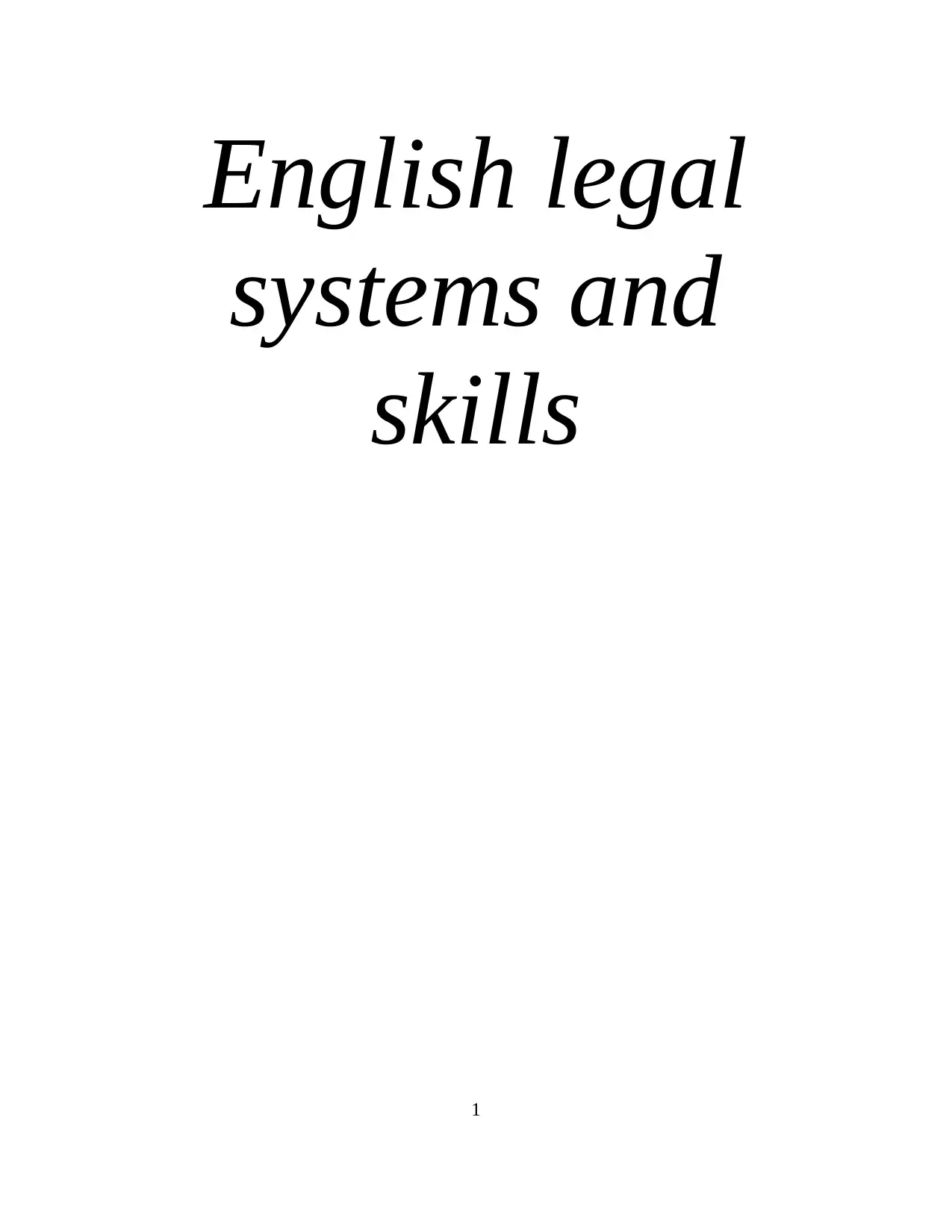
English legal
systems and
skills
1
systems and
skills
1
Secure Best Marks with AI Grader
Need help grading? Try our AI Grader for instant feedback on your assignments.
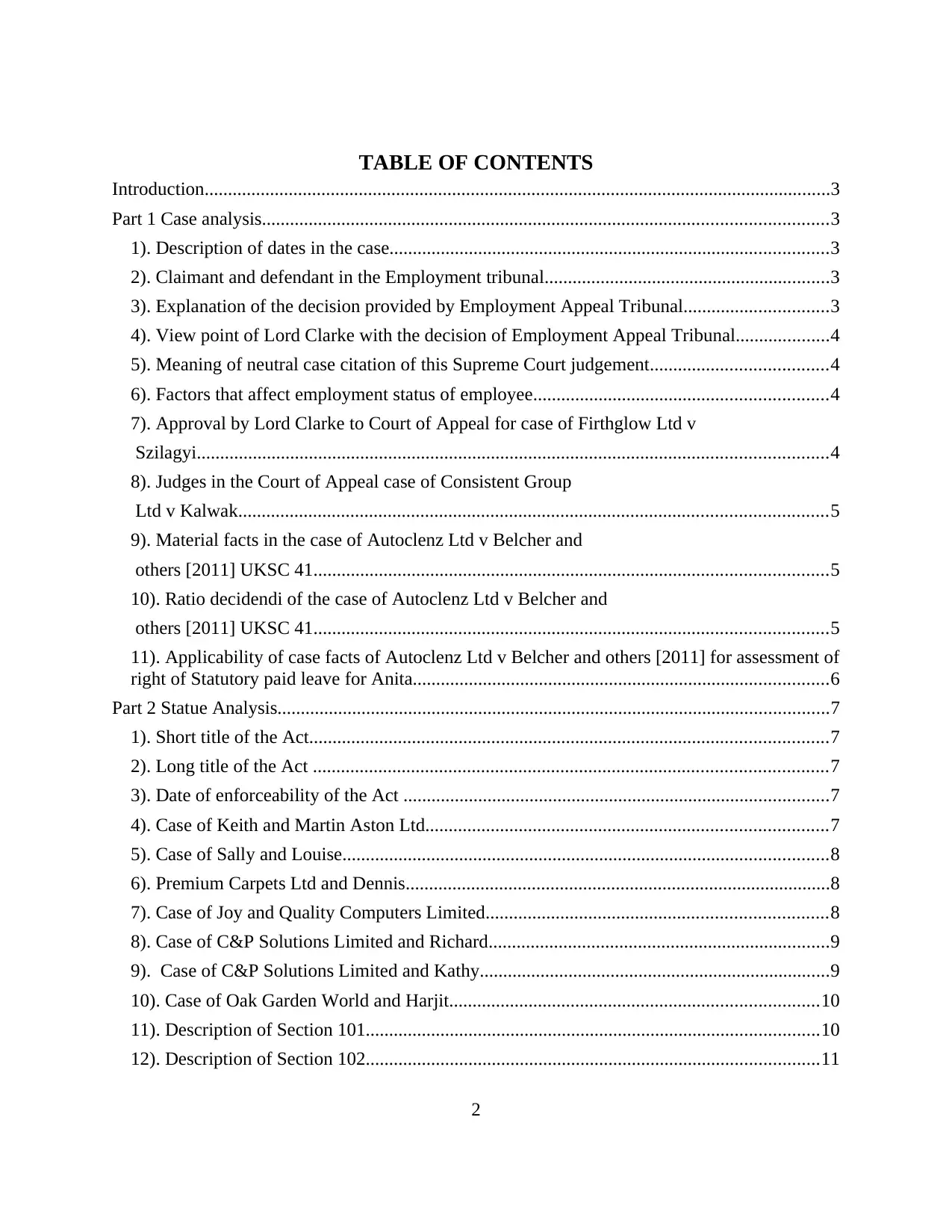
TABLE OF CONTENTS
Introduction......................................................................................................................................3
Part 1 Case analysis.........................................................................................................................3
1). Description of dates in the case..............................................................................................3
2). Claimant and defendant in the Employment tribunal.............................................................3
3). Explanation of the decision provided by Employment Appeal Tribunal...............................3
4). View point of Lord Clarke with the decision of Employment Appeal Tribunal....................4
5). Meaning of neutral case citation of this Supreme Court judgement......................................4
6). Factors that affect employment status of employee...............................................................4
7). Approval by Lord Clarke to Court of Appeal for case of Firthglow Ltd v
Szilagyi.......................................................................................................................................4
8). Judges in the Court of Appeal case of Consistent Group
Ltd v Kalwak..............................................................................................................................5
9). Material facts in the case of Autoclenz Ltd v Belcher and
others [2011] UKSC 41..............................................................................................................5
10). Ratio decidendi of the case of Autoclenz Ltd v Belcher and
others [2011] UKSC 41..............................................................................................................5
11). Applicability of case facts of Autoclenz Ltd v Belcher and others [2011] for assessment of
right of Statutory paid leave for Anita.........................................................................................6
Part 2 Statue Analysis......................................................................................................................7
1). Short title of the Act...............................................................................................................7
2). Long title of the Act ..............................................................................................................7
3). Date of enforceability of the Act ...........................................................................................7
4). Case of Keith and Martin Aston Ltd......................................................................................7
5). Case of Sally and Louise........................................................................................................8
6). Premium Carpets Ltd and Dennis...........................................................................................8
7). Case of Joy and Quality Computers Limited.........................................................................8
8). Case of C&P Solutions Limited and Richard.........................................................................9
9). Case of C&P Solutions Limited and Kathy...........................................................................9
10). Case of Oak Garden World and Harjit...............................................................................10
11). Description of Section 101.................................................................................................10
12). Description of Section 102.................................................................................................11
2
Introduction......................................................................................................................................3
Part 1 Case analysis.........................................................................................................................3
1). Description of dates in the case..............................................................................................3
2). Claimant and defendant in the Employment tribunal.............................................................3
3). Explanation of the decision provided by Employment Appeal Tribunal...............................3
4). View point of Lord Clarke with the decision of Employment Appeal Tribunal....................4
5). Meaning of neutral case citation of this Supreme Court judgement......................................4
6). Factors that affect employment status of employee...............................................................4
7). Approval by Lord Clarke to Court of Appeal for case of Firthglow Ltd v
Szilagyi.......................................................................................................................................4
8). Judges in the Court of Appeal case of Consistent Group
Ltd v Kalwak..............................................................................................................................5
9). Material facts in the case of Autoclenz Ltd v Belcher and
others [2011] UKSC 41..............................................................................................................5
10). Ratio decidendi of the case of Autoclenz Ltd v Belcher and
others [2011] UKSC 41..............................................................................................................5
11). Applicability of case facts of Autoclenz Ltd v Belcher and others [2011] for assessment of
right of Statutory paid leave for Anita.........................................................................................6
Part 2 Statue Analysis......................................................................................................................7
1). Short title of the Act...............................................................................................................7
2). Long title of the Act ..............................................................................................................7
3). Date of enforceability of the Act ...........................................................................................7
4). Case of Keith and Martin Aston Ltd......................................................................................7
5). Case of Sally and Louise........................................................................................................8
6). Premium Carpets Ltd and Dennis...........................................................................................8
7). Case of Joy and Quality Computers Limited.........................................................................8
8). Case of C&P Solutions Limited and Richard.........................................................................9
9). Case of C&P Solutions Limited and Kathy...........................................................................9
10). Case of Oak Garden World and Harjit...............................................................................10
11). Description of Section 101.................................................................................................10
12). Description of Section 102.................................................................................................11
2

Conclusion.....................................................................................................................................11
References......................................................................................................................................12
3
References......................................................................................................................................12
3
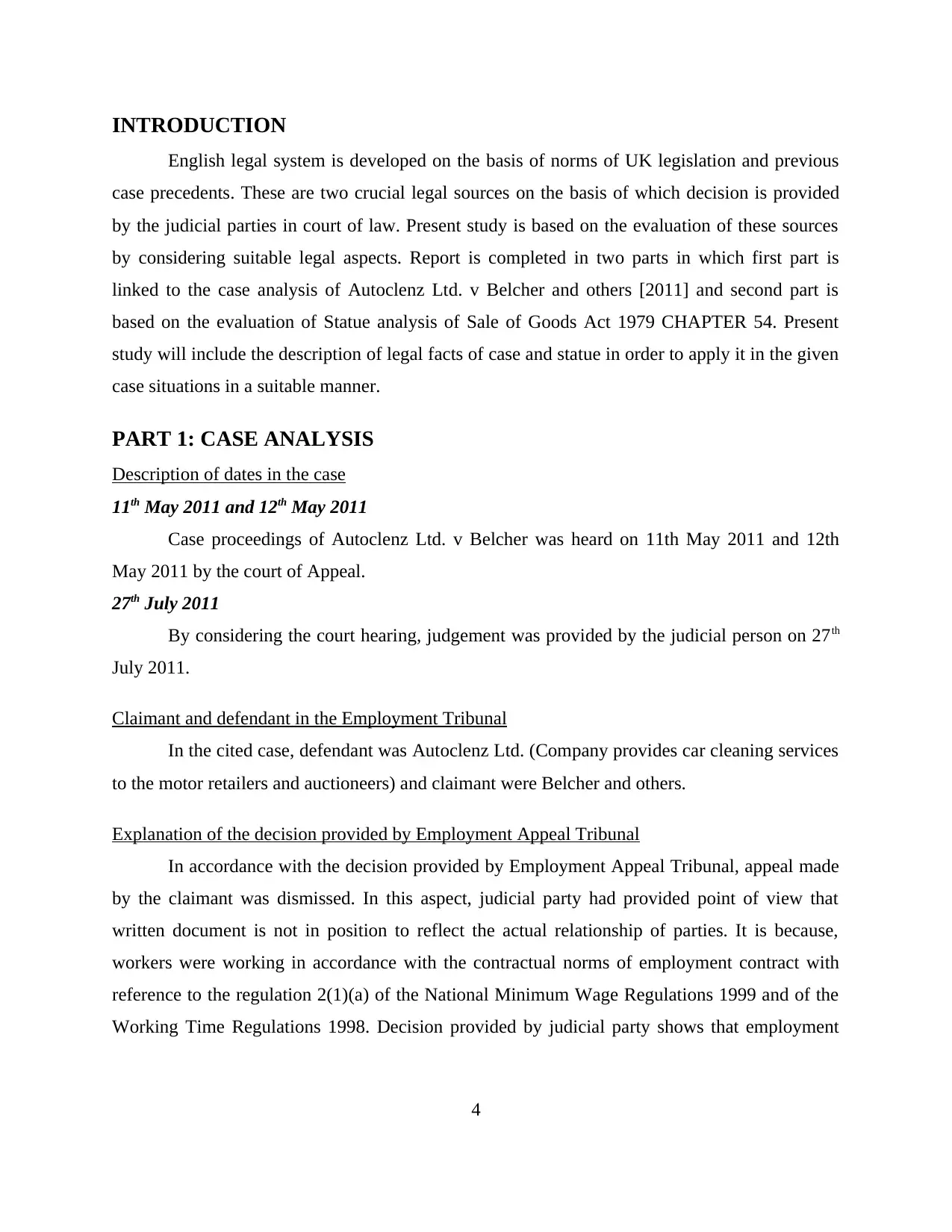
INTRODUCTION
English legal system is developed on the basis of norms of UK legislation and previous
case precedents. These are two crucial legal sources on the basis of which decision is provided
by the judicial parties in court of law. Present study is based on the evaluation of these sources
by considering suitable legal aspects. Report is completed in two parts in which first part is
linked to the case analysis of Autoclenz Ltd. v Belcher and others [2011] and second part is
based on the evaluation of Statue analysis of Sale of Goods Act 1979 CHAPTER 54. Present
study will include the description of legal facts of case and statue in order to apply it in the given
case situations in a suitable manner.
PART 1: CASE ANALYSIS
Description of dates in the case
11th May 2011 and 12th May 2011
Case proceedings of Autoclenz Ltd. v Belcher was heard on 11th May 2011 and 12th
May 2011 by the court of Appeal.
27th July 2011
By considering the court hearing, judgement was provided by the judicial person on 27th
July 2011.
Claimant and defendant in the Employment Tribunal
In the cited case, defendant was Autoclenz Ltd. (Company provides car cleaning services
to the motor retailers and auctioneers) and claimant were Belcher and others.
Explanation of the decision provided by Employment Appeal Tribunal
In accordance with the decision provided by Employment Appeal Tribunal, appeal made
by the claimant was dismissed. In this aspect, judicial party had provided point of view that
written document is not in position to reflect the actual relationship of parties. It is because,
workers were working in accordance with the contractual norms of employment contract with
reference to the regulation 2(1)(a) of the National Minimum Wage Regulations 1999 and of the
Working Time Regulations 1998. Decision provided by judicial party shows that employment
4
English legal system is developed on the basis of norms of UK legislation and previous
case precedents. These are two crucial legal sources on the basis of which decision is provided
by the judicial parties in court of law. Present study is based on the evaluation of these sources
by considering suitable legal aspects. Report is completed in two parts in which first part is
linked to the case analysis of Autoclenz Ltd. v Belcher and others [2011] and second part is
based on the evaluation of Statue analysis of Sale of Goods Act 1979 CHAPTER 54. Present
study will include the description of legal facts of case and statue in order to apply it in the given
case situations in a suitable manner.
PART 1: CASE ANALYSIS
Description of dates in the case
11th May 2011 and 12th May 2011
Case proceedings of Autoclenz Ltd. v Belcher was heard on 11th May 2011 and 12th
May 2011 by the court of Appeal.
27th July 2011
By considering the court hearing, judgement was provided by the judicial person on 27th
July 2011.
Claimant and defendant in the Employment Tribunal
In the cited case, defendant was Autoclenz Ltd. (Company provides car cleaning services
to the motor retailers and auctioneers) and claimant were Belcher and others.
Explanation of the decision provided by Employment Appeal Tribunal
In accordance with the decision provided by Employment Appeal Tribunal, appeal made
by the claimant was dismissed. In this aspect, judicial party had provided point of view that
written document is not in position to reflect the actual relationship of parties. It is because,
workers were working in accordance with the contractual norms of employment contract with
reference to the regulation 2(1)(a) of the National Minimum Wage Regulations 1999 and of the
Working Time Regulations 1998. Decision provided by judicial party shows that employment
4
Secure Best Marks with AI Grader
Need help grading? Try our AI Grader for instant feedback on your assignments.
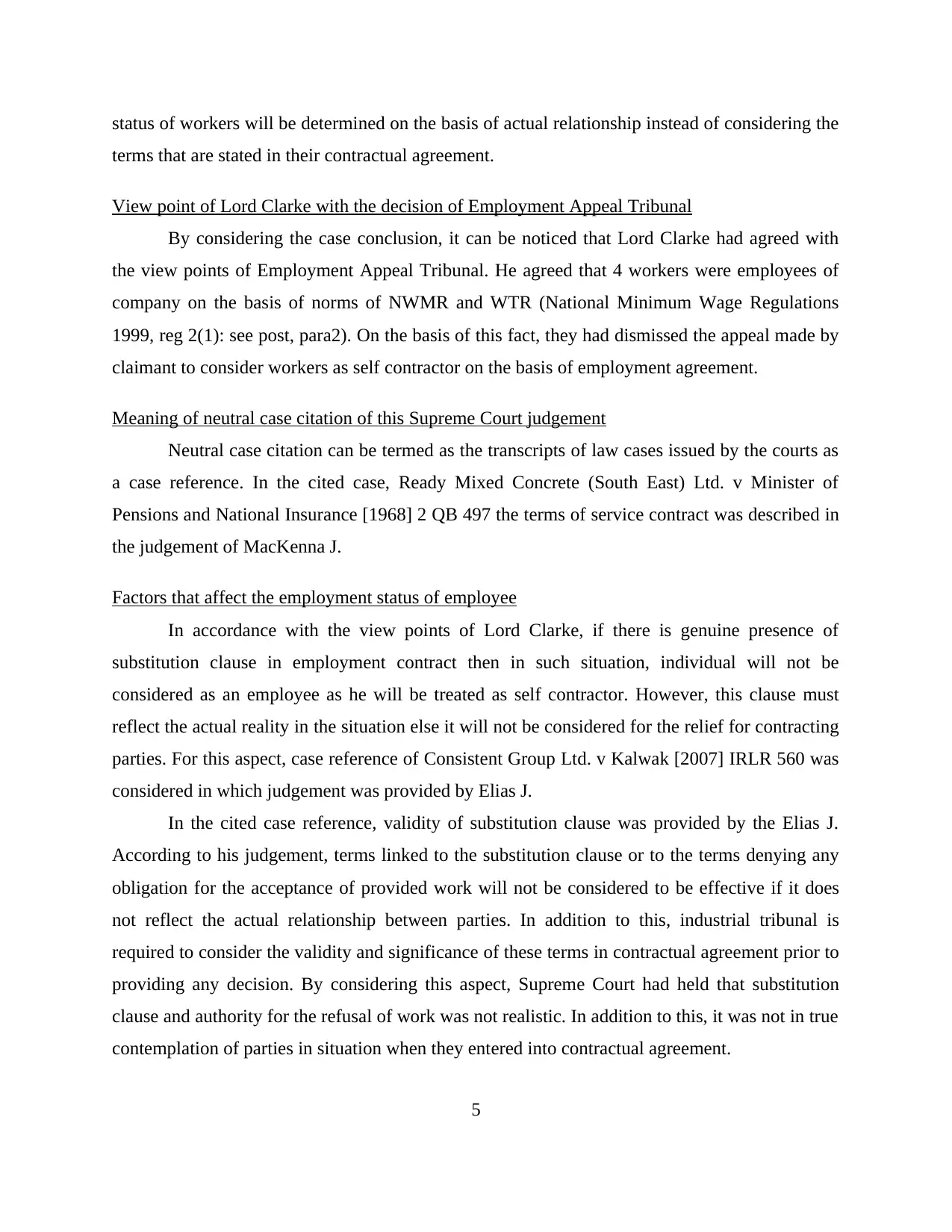
status of workers will be determined on the basis of actual relationship instead of considering the
terms that are stated in their contractual agreement.
View point of Lord Clarke with the decision of Employment Appeal Tribunal
By considering the case conclusion, it can be noticed that Lord Clarke had agreed with
the view points of Employment Appeal Tribunal. He agreed that 4 workers were employees of
company on the basis of norms of NWMR and WTR (National Minimum Wage Regulations
1999, reg 2(1): see post, para2). On the basis of this fact, they had dismissed the appeal made by
claimant to consider workers as self contractor on the basis of employment agreement.
Meaning of neutral case citation of this Supreme Court judgement
Neutral case citation can be termed as the transcripts of law cases issued by the courts as
a case reference. In the cited case, Ready Mixed Concrete (South East) Ltd. v Minister of
Pensions and National Insurance [1968] 2 QB 497 the terms of service contract was described in
the judgement of MacKenna J.
Factors that affect the employment status of employee
In accordance with the view points of Lord Clarke, if there is genuine presence of
substitution clause in employment contract then in such situation, individual will not be
considered as an employee as he will be treated as self contractor. However, this clause must
reflect the actual reality in the situation else it will not be considered for the relief for contracting
parties. For this aspect, case reference of Consistent Group Ltd. v Kalwak [2007] IRLR 560 was
considered in which judgement was provided by Elias J.
In the cited case reference, validity of substitution clause was provided by the Elias J.
According to his judgement, terms linked to the substitution clause or to the terms denying any
obligation for the acceptance of provided work will not be considered to be effective if it does
not reflect the actual relationship between parties. In addition to this, industrial tribunal is
required to consider the validity and significance of these terms in contractual agreement prior to
providing any decision. By considering this aspect, Supreme Court had held that substitution
clause and authority for the refusal of work was not realistic. In addition to this, it was not in true
contemplation of parties in situation when they entered into contractual agreement.
5
terms that are stated in their contractual agreement.
View point of Lord Clarke with the decision of Employment Appeal Tribunal
By considering the case conclusion, it can be noticed that Lord Clarke had agreed with
the view points of Employment Appeal Tribunal. He agreed that 4 workers were employees of
company on the basis of norms of NWMR and WTR (National Minimum Wage Regulations
1999, reg 2(1): see post, para2). On the basis of this fact, they had dismissed the appeal made by
claimant to consider workers as self contractor on the basis of employment agreement.
Meaning of neutral case citation of this Supreme Court judgement
Neutral case citation can be termed as the transcripts of law cases issued by the courts as
a case reference. In the cited case, Ready Mixed Concrete (South East) Ltd. v Minister of
Pensions and National Insurance [1968] 2 QB 497 the terms of service contract was described in
the judgement of MacKenna J.
Factors that affect the employment status of employee
In accordance with the view points of Lord Clarke, if there is genuine presence of
substitution clause in employment contract then in such situation, individual will not be
considered as an employee as he will be treated as self contractor. However, this clause must
reflect the actual reality in the situation else it will not be considered for the relief for contracting
parties. For this aspect, case reference of Consistent Group Ltd. v Kalwak [2007] IRLR 560 was
considered in which judgement was provided by Elias J.
In the cited case reference, validity of substitution clause was provided by the Elias J.
According to his judgement, terms linked to the substitution clause or to the terms denying any
obligation for the acceptance of provided work will not be considered to be effective if it does
not reflect the actual relationship between parties. In addition to this, industrial tribunal is
required to consider the validity and significance of these terms in contractual agreement prior to
providing any decision. By considering this aspect, Supreme Court had held that substitution
clause and authority for the refusal of work was not realistic. In addition to this, it was not in true
contemplation of parties in situation when they entered into contractual agreement.
5
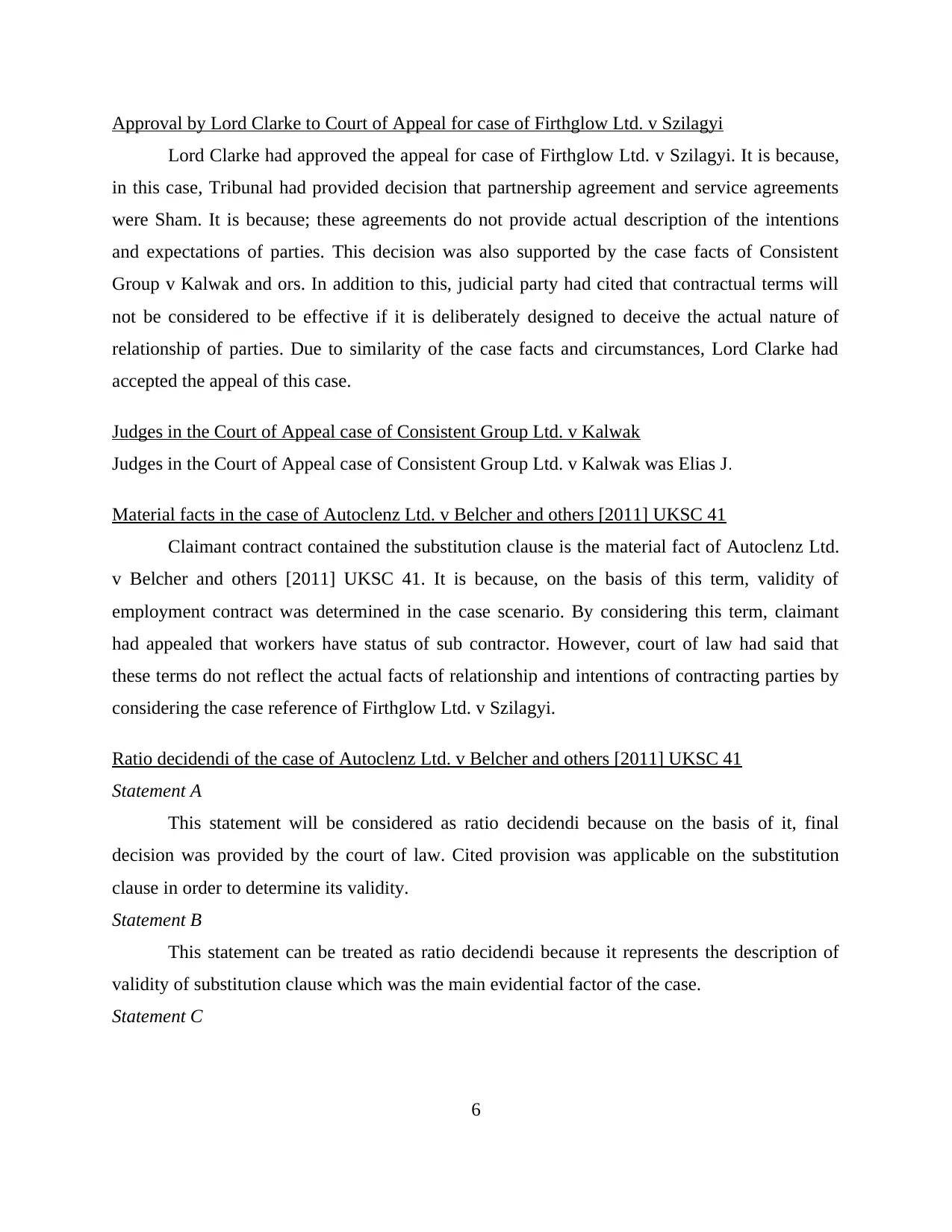
Approval by Lord Clarke to Court of Appeal for case of Firthglow Ltd. v Szilagyi
Lord Clarke had approved the appeal for case of Firthglow Ltd. v Szilagyi. It is because,
in this case, Tribunal had provided decision that partnership agreement and service agreements
were Sham. It is because; these agreements do not provide actual description of the intentions
and expectations of parties. This decision was also supported by the case facts of Consistent
Group v Kalwak and ors. In addition to this, judicial party had cited that contractual terms will
not be considered to be effective if it is deliberately designed to deceive the actual nature of
relationship of parties. Due to similarity of the case facts and circumstances, Lord Clarke had
accepted the appeal of this case.
Judges in the Court of Appeal case of Consistent Group Ltd. v Kalwak
Judges in the Court of Appeal case of Consistent Group Ltd. v Kalwak was Elias J.
Material facts in the case of Autoclenz Ltd. v Belcher and others [2011] UKSC 41
Claimant contract contained the substitution clause is the material fact of Autoclenz Ltd.
v Belcher and others [2011] UKSC 41. It is because, on the basis of this term, validity of
employment contract was determined in the case scenario. By considering this term, claimant
had appealed that workers have status of sub contractor. However, court of law had said that
these terms do not reflect the actual facts of relationship and intentions of contracting parties by
considering the case reference of Firthglow Ltd. v Szilagyi.
Ratio decidendi of the case of Autoclenz Ltd. v Belcher and others [2011] UKSC 41
Statement A
This statement will be considered as ratio decidendi because on the basis of it, final
decision was provided by the court of law. Cited provision was applicable on the substitution
clause in order to determine its validity.
Statement B
This statement can be treated as ratio decidendi because it represents the description of
validity of substitution clause which was the main evidential factor of the case.
Statement C
6
Lord Clarke had approved the appeal for case of Firthglow Ltd. v Szilagyi. It is because,
in this case, Tribunal had provided decision that partnership agreement and service agreements
were Sham. It is because; these agreements do not provide actual description of the intentions
and expectations of parties. This decision was also supported by the case facts of Consistent
Group v Kalwak and ors. In addition to this, judicial party had cited that contractual terms will
not be considered to be effective if it is deliberately designed to deceive the actual nature of
relationship of parties. Due to similarity of the case facts and circumstances, Lord Clarke had
accepted the appeal of this case.
Judges in the Court of Appeal case of Consistent Group Ltd. v Kalwak
Judges in the Court of Appeal case of Consistent Group Ltd. v Kalwak was Elias J.
Material facts in the case of Autoclenz Ltd. v Belcher and others [2011] UKSC 41
Claimant contract contained the substitution clause is the material fact of Autoclenz Ltd.
v Belcher and others [2011] UKSC 41. It is because, on the basis of this term, validity of
employment contract was determined in the case scenario. By considering this term, claimant
had appealed that workers have status of sub contractor. However, court of law had said that
these terms do not reflect the actual facts of relationship and intentions of contracting parties by
considering the case reference of Firthglow Ltd. v Szilagyi.
Ratio decidendi of the case of Autoclenz Ltd. v Belcher and others [2011] UKSC 41
Statement A
This statement will be considered as ratio decidendi because on the basis of it, final
decision was provided by the court of law. Cited provision was applicable on the substitution
clause in order to determine its validity.
Statement B
This statement can be treated as ratio decidendi because it represents the description of
validity of substitution clause which was the main evidential factor of the case.
Statement C
6
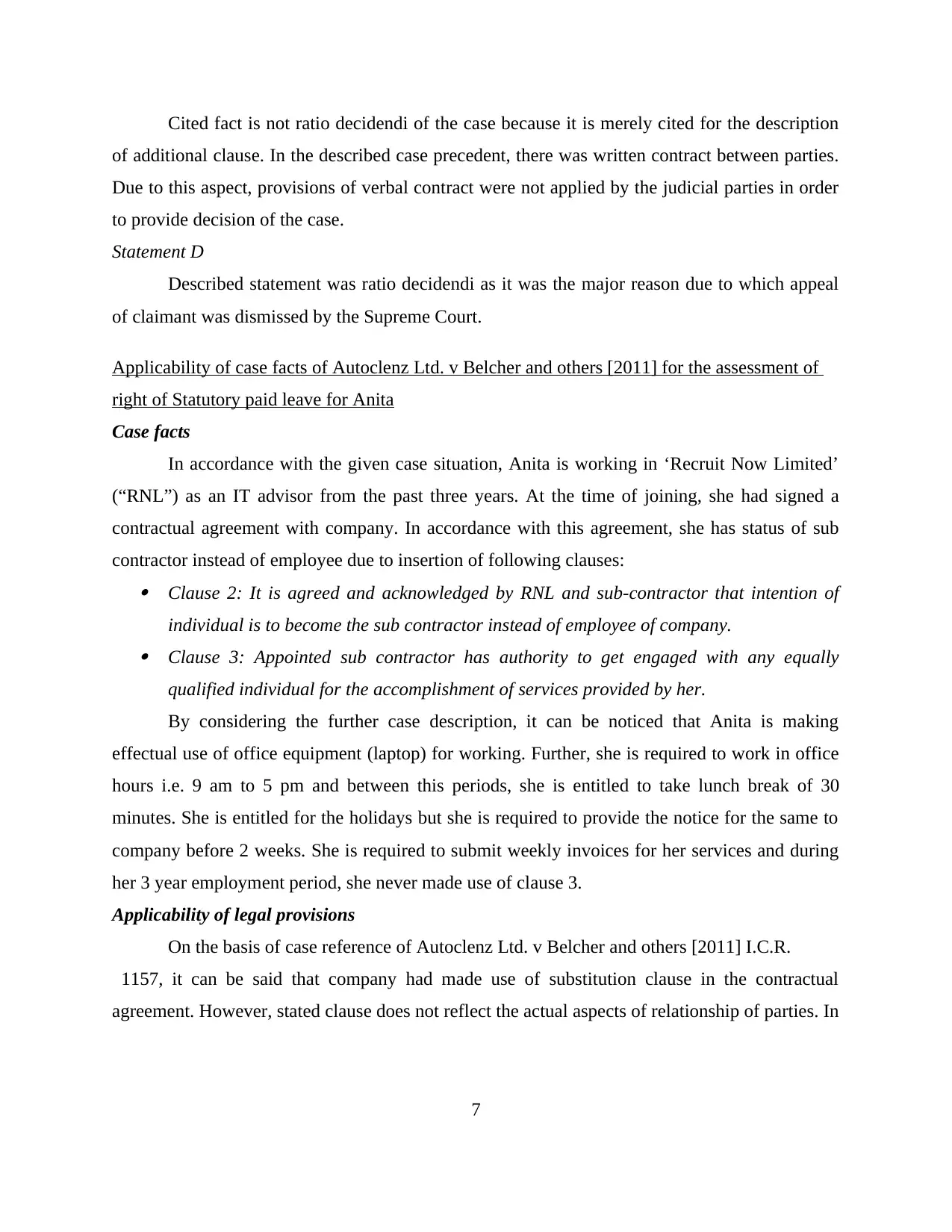
Cited fact is not ratio decidendi of the case because it is merely cited for the description
of additional clause. In the described case precedent, there was written contract between parties.
Due to this aspect, provisions of verbal contract were not applied by the judicial parties in order
to provide decision of the case.
Statement D
Described statement was ratio decidendi as it was the major reason due to which appeal
of claimant was dismissed by the Supreme Court.
Applicability of case facts of Autoclenz Ltd. v Belcher and others [2011] for the assessment of
right of Statutory paid leave for Anita
Case facts
In accordance with the given case situation, Anita is working in ‘Recruit Now Limited’
(“RNL”) as an IT advisor from the past three years. At the time of joining, she had signed a
contractual agreement with company. In accordance with this agreement, she has status of sub
contractor instead of employee due to insertion of following clauses: Clause 2: It is agreed and acknowledged by RNL and sub-contractor that intention of
individual is to become the sub contractor instead of employee of company. Clause 3: Appointed sub contractor has authority to get engaged with any equally
qualified individual for the accomplishment of services provided by her.
By considering the further case description, it can be noticed that Anita is making
effectual use of office equipment (laptop) for working. Further, she is required to work in office
hours i.e. 9 am to 5 pm and between this periods, she is entitled to take lunch break of 30
minutes. She is entitled for the holidays but she is required to provide the notice for the same to
company before 2 weeks. She is required to submit weekly invoices for her services and during
her 3 year employment period, she never made use of clause 3.
Applicability of legal provisions
On the basis of case reference of Autoclenz Ltd. v Belcher and others [2011] I.C.R.
1157, it can be said that company had made use of substitution clause in the contractual
agreement. However, stated clause does not reflect the actual aspects of relationship of parties. In
7
of additional clause. In the described case precedent, there was written contract between parties.
Due to this aspect, provisions of verbal contract were not applied by the judicial parties in order
to provide decision of the case.
Statement D
Described statement was ratio decidendi as it was the major reason due to which appeal
of claimant was dismissed by the Supreme Court.
Applicability of case facts of Autoclenz Ltd. v Belcher and others [2011] for the assessment of
right of Statutory paid leave for Anita
Case facts
In accordance with the given case situation, Anita is working in ‘Recruit Now Limited’
(“RNL”) as an IT advisor from the past three years. At the time of joining, she had signed a
contractual agreement with company. In accordance with this agreement, she has status of sub
contractor instead of employee due to insertion of following clauses: Clause 2: It is agreed and acknowledged by RNL and sub-contractor that intention of
individual is to become the sub contractor instead of employee of company. Clause 3: Appointed sub contractor has authority to get engaged with any equally
qualified individual for the accomplishment of services provided by her.
By considering the further case description, it can be noticed that Anita is making
effectual use of office equipment (laptop) for working. Further, she is required to work in office
hours i.e. 9 am to 5 pm and between this periods, she is entitled to take lunch break of 30
minutes. She is entitled for the holidays but she is required to provide the notice for the same to
company before 2 weeks. She is required to submit weekly invoices for her services and during
her 3 year employment period, she never made use of clause 3.
Applicability of legal provisions
On the basis of case reference of Autoclenz Ltd. v Belcher and others [2011] I.C.R.
1157, it can be said that company had made use of substitution clause in the contractual
agreement. However, stated clause does not reflect the actual aspects of relationship of parties. In
7
Paraphrase This Document
Need a fresh take? Get an instant paraphrase of this document with our AI Paraphraser
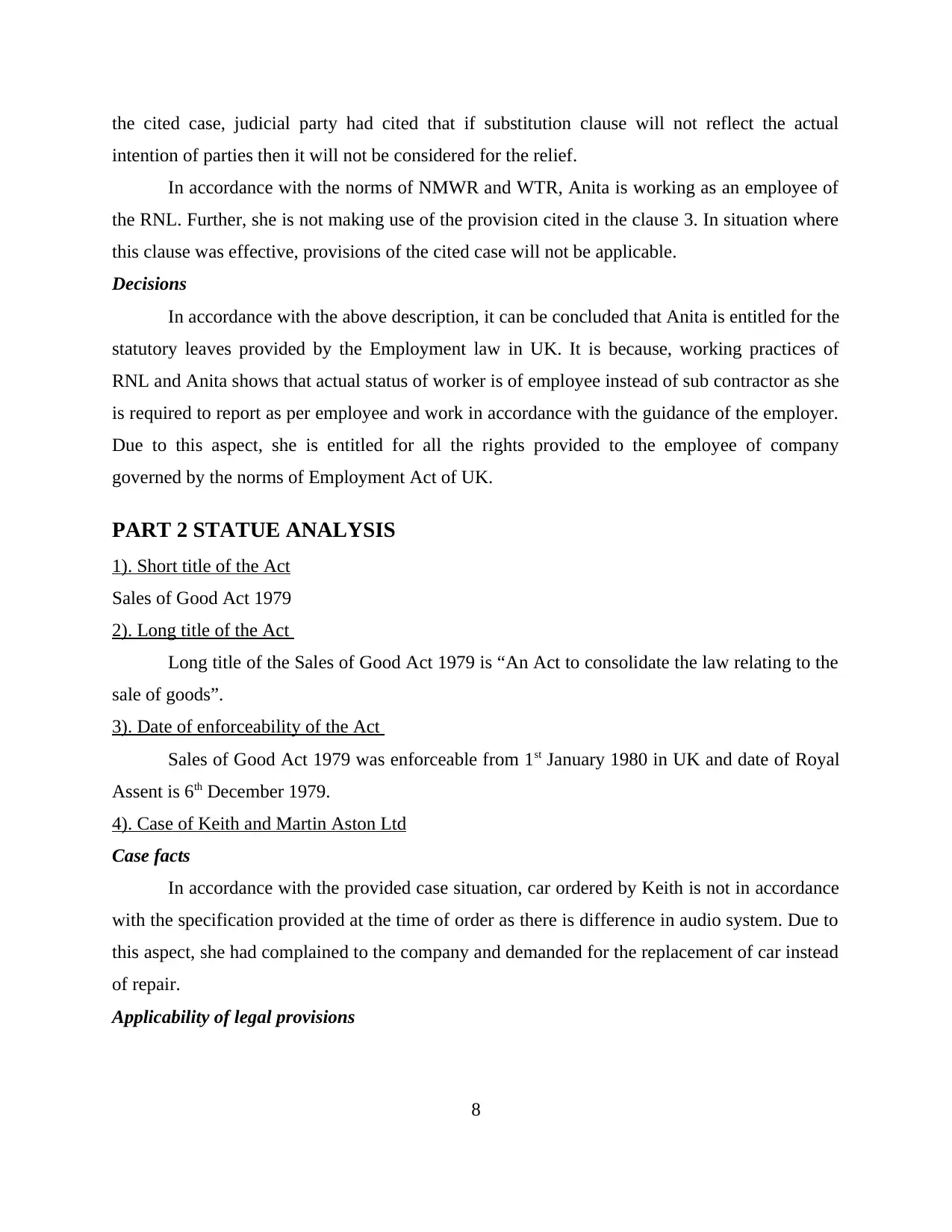
the cited case, judicial party had cited that if substitution clause will not reflect the actual
intention of parties then it will not be considered for the relief.
In accordance with the norms of NMWR and WTR, Anita is working as an employee of
the RNL. Further, she is not making use of the provision cited in the clause 3. In situation where
this clause was effective, provisions of the cited case will not be applicable.
Decisions
In accordance with the above description, it can be concluded that Anita is entitled for the
statutory leaves provided by the Employment law in UK. It is because, working practices of
RNL and Anita shows that actual status of worker is of employee instead of sub contractor as she
is required to report as per employee and work in accordance with the guidance of the employer.
Due to this aspect, she is entitled for all the rights provided to the employee of company
governed by the norms of Employment Act of UK.
PART 2 STATUE ANALYSIS
1). Short title of the Act
Sales of Good Act 1979
2). Long title of the Act
Long title of the Sales of Good Act 1979 is “An Act to consolidate the law relating to the
sale of goods”.
3). Date of enforceability of the Act
Sales of Good Act 1979 was enforceable from 1st January 1980 in UK and date of Royal
Assent is 6th December 1979.
4). Case of Keith and Martin Aston Ltd
Case facts
In accordance with the provided case situation, car ordered by Keith is not in accordance
with the specification provided at the time of order as there is difference in audio system. Due to
this aspect, she had complained to the company and demanded for the replacement of car instead
of repair.
Applicability of legal provisions
8
intention of parties then it will not be considered for the relief.
In accordance with the norms of NMWR and WTR, Anita is working as an employee of
the RNL. Further, she is not making use of the provision cited in the clause 3. In situation where
this clause was effective, provisions of the cited case will not be applicable.
Decisions
In accordance with the above description, it can be concluded that Anita is entitled for the
statutory leaves provided by the Employment law in UK. It is because, working practices of
RNL and Anita shows that actual status of worker is of employee instead of sub contractor as she
is required to report as per employee and work in accordance with the guidance of the employer.
Due to this aspect, she is entitled for all the rights provided to the employee of company
governed by the norms of Employment Act of UK.
PART 2 STATUE ANALYSIS
1). Short title of the Act
Sales of Good Act 1979
2). Long title of the Act
Long title of the Sales of Good Act 1979 is “An Act to consolidate the law relating to the
sale of goods”.
3). Date of enforceability of the Act
Sales of Good Act 1979 was enforceable from 1st January 1980 in UK and date of Royal
Assent is 6th December 1979.
4). Case of Keith and Martin Aston Ltd
Case facts
In accordance with the provided case situation, car ordered by Keith is not in accordance
with the specification provided at the time of order as there is difference in audio system. Due to
this aspect, she had complained to the company and demanded for the replacement of car instead
of repair.
Applicability of legal provisions
8
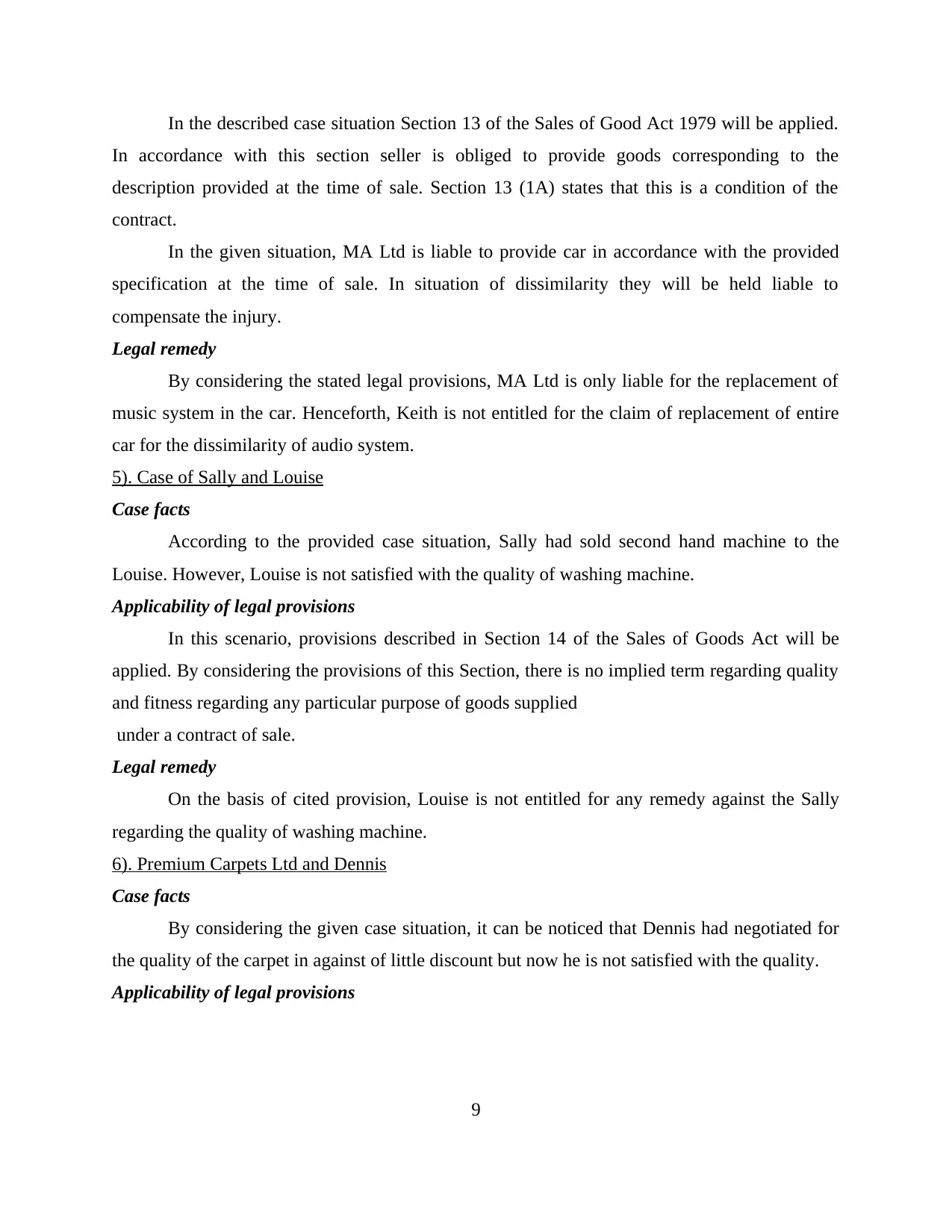
In the described case situation Section 13 of the Sales of Good Act 1979 will be applied.
In accordance with this section seller is obliged to provide goods corresponding to the
description provided at the time of sale. Section 13 (1A) states that this is a condition of the
contract.
In the given situation, MA Ltd is liable to provide car in accordance with the provided
specification at the time of sale. In situation of dissimilarity they will be held liable to
compensate the injury.
Legal remedy
By considering the stated legal provisions, MA Ltd is only liable for the replacement of
music system in the car. Henceforth, Keith is not entitled for the claim of replacement of entire
car for the dissimilarity of audio system.
5). Case of Sally and Louise
Case facts
According to the provided case situation, Sally had sold second hand machine to the
Louise. However, Louise is not satisfied with the quality of washing machine.
Applicability of legal provisions
In this scenario, provisions described in Section 14 of the Sales of Goods Act will be
applied. By considering the provisions of this Section, there is no implied term regarding quality
and fitness regarding any particular purpose of goods supplied
under a contract of sale.
Legal remedy
On the basis of cited provision, Louise is not entitled for any remedy against the Sally
regarding the quality of washing machine.
6). Premium Carpets Ltd and Dennis
Case facts
By considering the given case situation, it can be noticed that Dennis had negotiated for
the quality of the carpet in against of little discount but now he is not satisfied with the quality.
Applicability of legal provisions
9
In accordance with this section seller is obliged to provide goods corresponding to the
description provided at the time of sale. Section 13 (1A) states that this is a condition of the
contract.
In the given situation, MA Ltd is liable to provide car in accordance with the provided
specification at the time of sale. In situation of dissimilarity they will be held liable to
compensate the injury.
Legal remedy
By considering the stated legal provisions, MA Ltd is only liable for the replacement of
music system in the car. Henceforth, Keith is not entitled for the claim of replacement of entire
car for the dissimilarity of audio system.
5). Case of Sally and Louise
Case facts
According to the provided case situation, Sally had sold second hand machine to the
Louise. However, Louise is not satisfied with the quality of washing machine.
Applicability of legal provisions
In this scenario, provisions described in Section 14 of the Sales of Goods Act will be
applied. By considering the provisions of this Section, there is no implied term regarding quality
and fitness regarding any particular purpose of goods supplied
under a contract of sale.
Legal remedy
On the basis of cited provision, Louise is not entitled for any remedy against the Sally
regarding the quality of washing machine.
6). Premium Carpets Ltd and Dennis
Case facts
By considering the given case situation, it can be noticed that Dennis had negotiated for
the quality of the carpet in against of little discount but now he is not satisfied with the quality.
Applicability of legal provisions
9
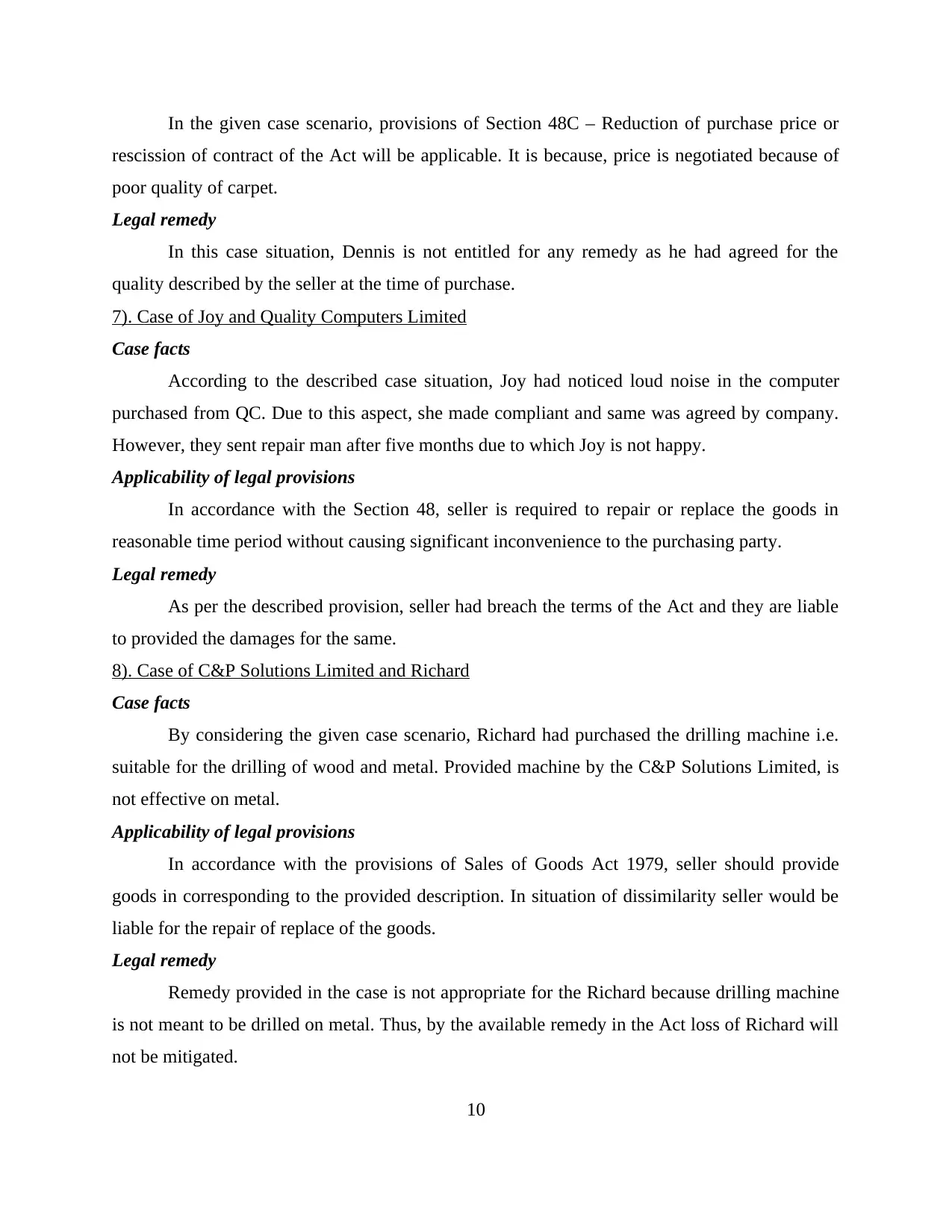
In the given case scenario, provisions of Section 48C – Reduction of purchase price or
rescission of contract of the Act will be applicable. It is because, price is negotiated because of
poor quality of carpet.
Legal remedy
In this case situation, Dennis is not entitled for any remedy as he had agreed for the
quality described by the seller at the time of purchase.
7). Case of Joy and Quality Computers Limited
Case facts
According to the described case situation, Joy had noticed loud noise in the computer
purchased from QC. Due to this aspect, she made compliant and same was agreed by company.
However, they sent repair man after five months due to which Joy is not happy.
Applicability of legal provisions
In accordance with the Section 48, seller is required to repair or replace the goods in
reasonable time period without causing significant inconvenience to the purchasing party.
Legal remedy
As per the described provision, seller had breach the terms of the Act and they are liable
to provided the damages for the same.
8). Case of C&P Solutions Limited and Richard
Case facts
By considering the given case scenario, Richard had purchased the drilling machine i.e.
suitable for the drilling of wood and metal. Provided machine by the C&P Solutions Limited, is
not effective on metal.
Applicability of legal provisions
In accordance with the provisions of Sales of Goods Act 1979, seller should provide
goods in corresponding to the provided description. In situation of dissimilarity seller would be
liable for the repair of replace of the goods.
Legal remedy
Remedy provided in the case is not appropriate for the Richard because drilling machine
is not meant to be drilled on metal. Thus, by the available remedy in the Act loss of Richard will
not be mitigated.
10
rescission of contract of the Act will be applicable. It is because, price is negotiated because of
poor quality of carpet.
Legal remedy
In this case situation, Dennis is not entitled for any remedy as he had agreed for the
quality described by the seller at the time of purchase.
7). Case of Joy and Quality Computers Limited
Case facts
According to the described case situation, Joy had noticed loud noise in the computer
purchased from QC. Due to this aspect, she made compliant and same was agreed by company.
However, they sent repair man after five months due to which Joy is not happy.
Applicability of legal provisions
In accordance with the Section 48, seller is required to repair or replace the goods in
reasonable time period without causing significant inconvenience to the purchasing party.
Legal remedy
As per the described provision, seller had breach the terms of the Act and they are liable
to provided the damages for the same.
8). Case of C&P Solutions Limited and Richard
Case facts
By considering the given case scenario, Richard had purchased the drilling machine i.e.
suitable for the drilling of wood and metal. Provided machine by the C&P Solutions Limited, is
not effective on metal.
Applicability of legal provisions
In accordance with the provisions of Sales of Goods Act 1979, seller should provide
goods in corresponding to the provided description. In situation of dissimilarity seller would be
liable for the repair of replace of the goods.
Legal remedy
Remedy provided in the case is not appropriate for the Richard because drilling machine
is not meant to be drilled on metal. Thus, by the available remedy in the Act loss of Richard will
not be mitigated.
10
Secure Best Marks with AI Grader
Need help grading? Try our AI Grader for instant feedback on your assignments.
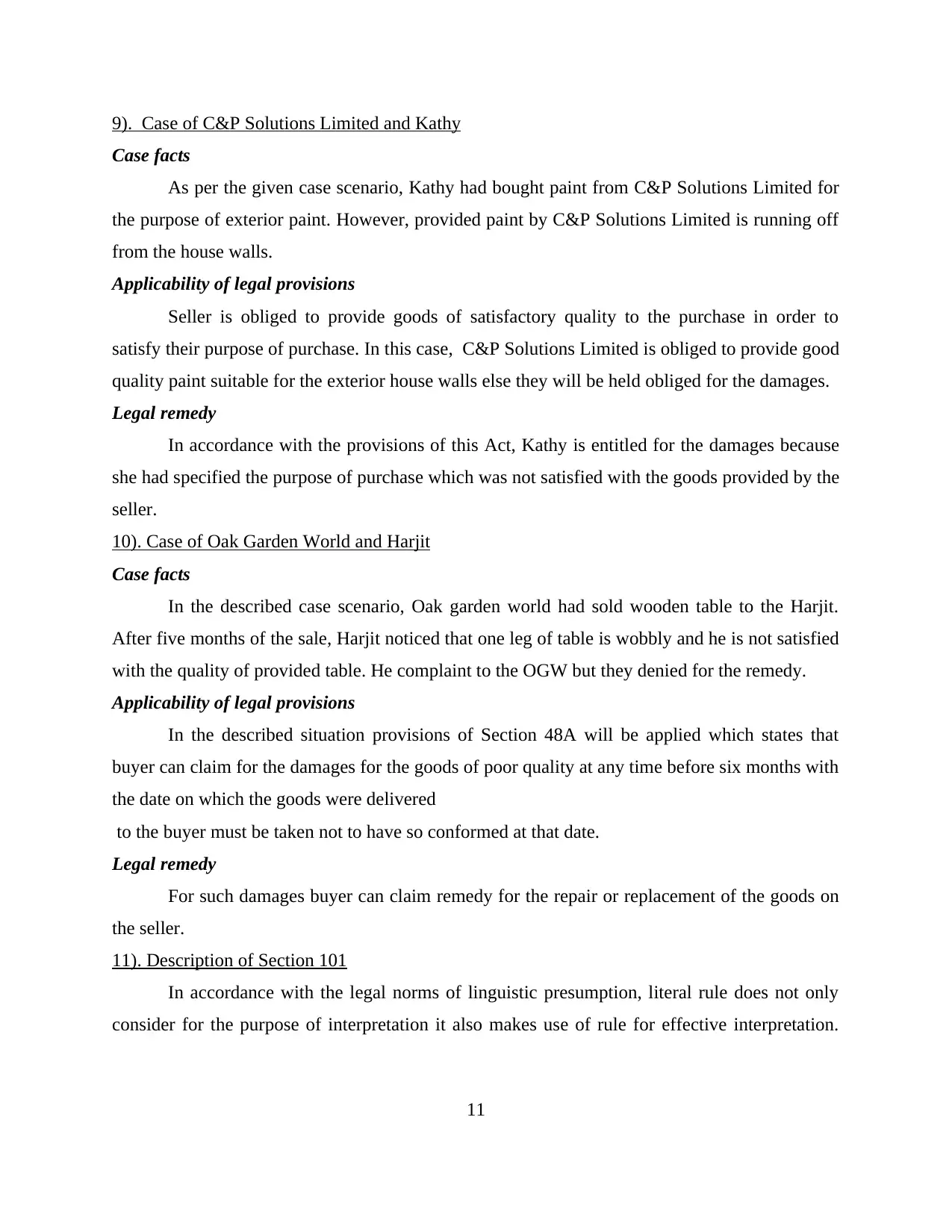
9). Case of C&P Solutions Limited and Kathy
Case facts
As per the given case scenario, Kathy had bought paint from C&P Solutions Limited for
the purpose of exterior paint. However, provided paint by C&P Solutions Limited is running off
from the house walls.
Applicability of legal provisions
Seller is obliged to provide goods of satisfactory quality to the purchase in order to
satisfy their purpose of purchase. In this case, C&P Solutions Limited is obliged to provide good
quality paint suitable for the exterior house walls else they will be held obliged for the damages.
Legal remedy
In accordance with the provisions of this Act, Kathy is entitled for the damages because
she had specified the purpose of purchase which was not satisfied with the goods provided by the
seller.
10). Case of Oak Garden World and Harjit
Case facts
In the described case scenario, Oak garden world had sold wooden table to the Harjit.
After five months of the sale, Harjit noticed that one leg of table is wobbly and he is not satisfied
with the quality of provided table. He complaint to the OGW but they denied for the remedy.
Applicability of legal provisions
In the described situation provisions of Section 48A will be applied which states that
buyer can claim for the damages for the goods of poor quality at any time before six months with
the date on which the goods were delivered
to the buyer must be taken not to have so conformed at that date.
Legal remedy
For such damages buyer can claim remedy for the repair or replacement of the goods on
the seller.
11). Description of Section 101
In accordance with the legal norms of linguistic presumption, literal rule does not only
consider for the purpose of interpretation it also makes use of rule for effective interpretation.
11
Case facts
As per the given case scenario, Kathy had bought paint from C&P Solutions Limited for
the purpose of exterior paint. However, provided paint by C&P Solutions Limited is running off
from the house walls.
Applicability of legal provisions
Seller is obliged to provide goods of satisfactory quality to the purchase in order to
satisfy their purpose of purchase. In this case, C&P Solutions Limited is obliged to provide good
quality paint suitable for the exterior house walls else they will be held obliged for the damages.
Legal remedy
In accordance with the provisions of this Act, Kathy is entitled for the damages because
she had specified the purpose of purchase which was not satisfied with the goods provided by the
seller.
10). Case of Oak Garden World and Harjit
Case facts
In the described case scenario, Oak garden world had sold wooden table to the Harjit.
After five months of the sale, Harjit noticed that one leg of table is wobbly and he is not satisfied
with the quality of provided table. He complaint to the OGW but they denied for the remedy.
Applicability of legal provisions
In the described situation provisions of Section 48A will be applied which states that
buyer can claim for the damages for the goods of poor quality at any time before six months with
the date on which the goods were delivered
to the buyer must be taken not to have so conformed at that date.
Legal remedy
For such damages buyer can claim remedy for the repair or replacement of the goods on
the seller.
11). Description of Section 101
In accordance with the legal norms of linguistic presumption, literal rule does not only
consider for the purpose of interpretation it also makes use of rule for effective interpretation.
11
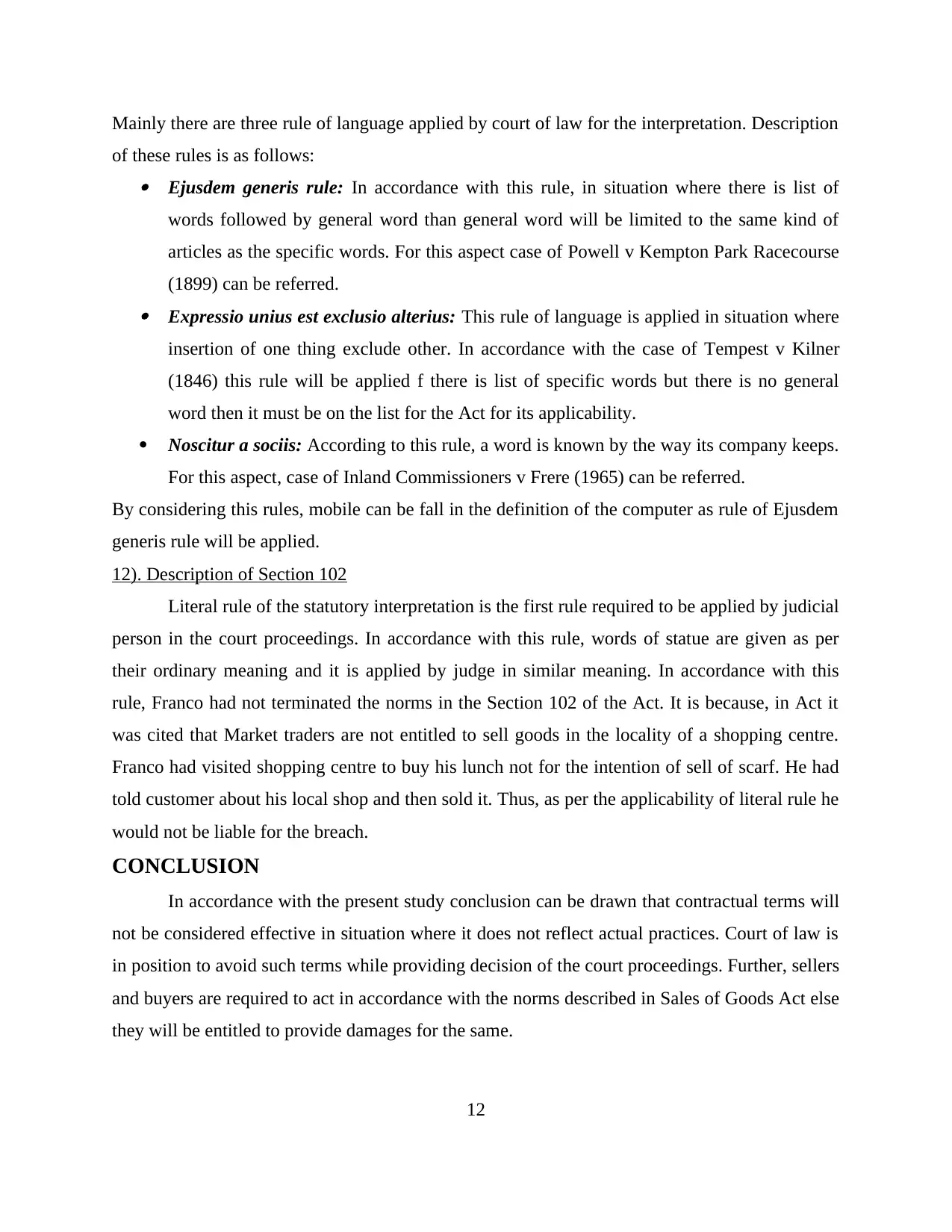
Mainly there are three rule of language applied by court of law for the interpretation. Description
of these rules is as follows: Ejusdem generis rule: In accordance with this rule, in situation where there is list of
words followed by general word than general word will be limited to the same kind of
articles as the specific words. For this aspect case of Powell v Kempton Park Racecourse
(1899) can be referred. Expressio unius est exclusio alterius: This rule of language is applied in situation where
insertion of one thing exclude other. In accordance with the case of Tempest v Kilner
(1846) this rule will be applied f there is list of specific words but there is no general
word then it must be on the list for the Act for its applicability.
Noscitur a sociis: According to this rule, a word is known by the way its company keeps.
For this aspect, case of Inland Commissioners v Frere (1965) can be referred.
By considering this rules, mobile can be fall in the definition of the computer as rule of Ejusdem
generis rule will be applied.
12). Description of Section 102
Literal rule of the statutory interpretation is the first rule required to be applied by judicial
person in the court proceedings. In accordance with this rule, words of statue are given as per
their ordinary meaning and it is applied by judge in similar meaning. In accordance with this
rule, Franco had not terminated the norms in the Section 102 of the Act. It is because, in Act it
was cited that Market traders are not entitled to sell goods in the locality of a shopping centre.
Franco had visited shopping centre to buy his lunch not for the intention of sell of scarf. He had
told customer about his local shop and then sold it. Thus, as per the applicability of literal rule he
would not be liable for the breach.
CONCLUSION
In accordance with the present study conclusion can be drawn that contractual terms will
not be considered effective in situation where it does not reflect actual practices. Court of law is
in position to avoid such terms while providing decision of the court proceedings. Further, sellers
and buyers are required to act in accordance with the norms described in Sales of Goods Act else
they will be entitled to provide damages for the same.
12
of these rules is as follows: Ejusdem generis rule: In accordance with this rule, in situation where there is list of
words followed by general word than general word will be limited to the same kind of
articles as the specific words. For this aspect case of Powell v Kempton Park Racecourse
(1899) can be referred. Expressio unius est exclusio alterius: This rule of language is applied in situation where
insertion of one thing exclude other. In accordance with the case of Tempest v Kilner
(1846) this rule will be applied f there is list of specific words but there is no general
word then it must be on the list for the Act for its applicability.
Noscitur a sociis: According to this rule, a word is known by the way its company keeps.
For this aspect, case of Inland Commissioners v Frere (1965) can be referred.
By considering this rules, mobile can be fall in the definition of the computer as rule of Ejusdem
generis rule will be applied.
12). Description of Section 102
Literal rule of the statutory interpretation is the first rule required to be applied by judicial
person in the court proceedings. In accordance with this rule, words of statue are given as per
their ordinary meaning and it is applied by judge in similar meaning. In accordance with this
rule, Franco had not terminated the norms in the Section 102 of the Act. It is because, in Act it
was cited that Market traders are not entitled to sell goods in the locality of a shopping centre.
Franco had visited shopping centre to buy his lunch not for the intention of sell of scarf. He had
told customer about his local shop and then sold it. Thus, as per the applicability of literal rule he
would not be liable for the breach.
CONCLUSION
In accordance with the present study conclusion can be drawn that contractual terms will
not be considered effective in situation where it does not reflect actual practices. Court of law is
in position to avoid such terms while providing decision of the court proceedings. Further, sellers
and buyers are required to act in accordance with the norms described in Sales of Goods Act else
they will be entitled to provide damages for the same.
12

13
1 out of 13
Your All-in-One AI-Powered Toolkit for Academic Success.
+13062052269
info@desklib.com
Available 24*7 on WhatsApp / Email
![[object Object]](/_next/static/media/star-bottom.7253800d.svg)
Unlock your academic potential
© 2024 | Zucol Services PVT LTD | All rights reserved.
